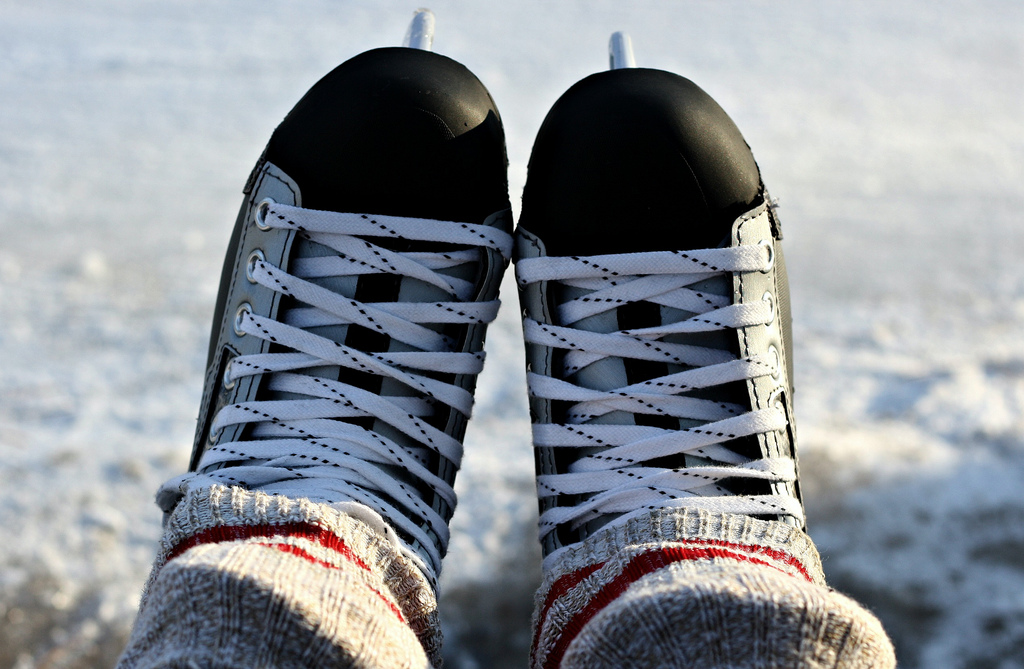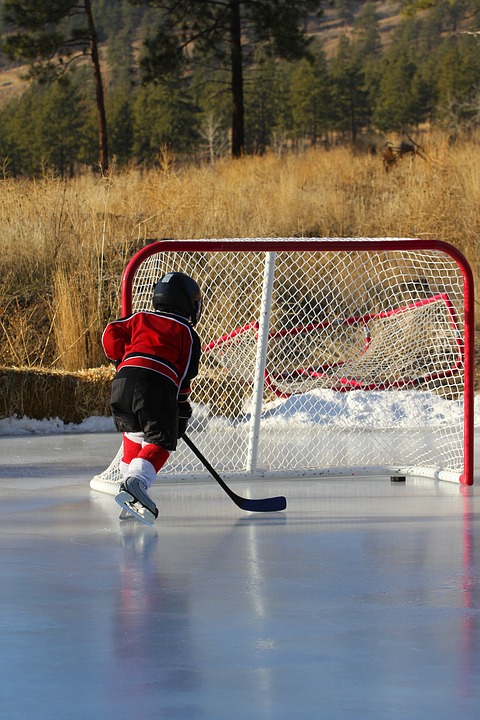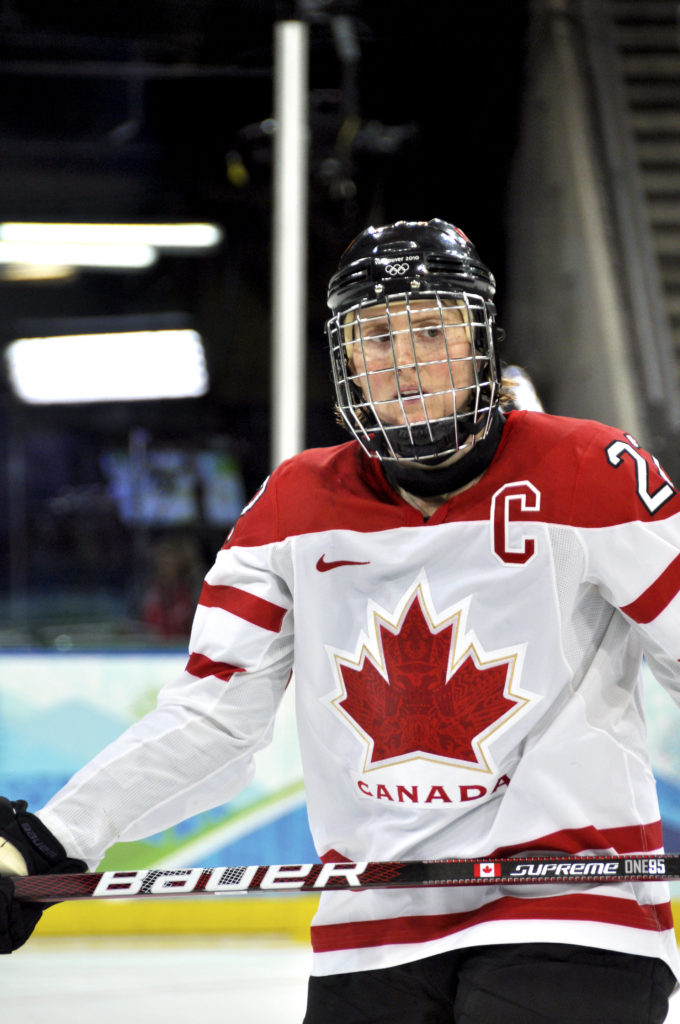
Hayley Wickenheiser redefined women’s sports for me and countless others
By Emilie Medland-Marchen, January 17 2017 —
Canadian hockey legend and former Dinos women’s hockey player Hayley Wickenheiser announced her retirement on Jan. 13, 2017. In a way so uncharacteristic of her explosive career, Wickenheiser quietly posted on Twitter that she would be hanging up her skates.
The news erupted across social media, where thousands of fans shared their memories of Wickenheiser and immense gratitude for her service to Canada. Wickenheiser won four Olympic gold medals and one silver during her career. She put up 168 goals and 211 assists for Team Canada and was twice named Olympic tournament MVP.
But Wickenheiser’s impact extends beyond her stat sheet. She stands as a symbol of female athletic greatness — an idol to thousands of young girls who were inspired by her success, her grit and her absolute determination to give her best to the game.

// Photo: Public domain
I was one of the many young girls who idealized Wick as the epitome of girl-power and athletic resilience. In Finland in 2003 she became the first woman to score a goal in a men’s professional league. She would go on to play 23 games in the division, scoring two goals and adding two assists to her resumé. Her ability to run with the boys absolutely fascinated me and perfectly matched the tomboyish attitude I developed as a kid that would later grow into an affinity for feminist activism.
At a young age I was enrolled in the hockey program in small-town Kitimat, British Columbia. Like many Canadian children, I learned how to skate on a one-surface ice box. In those small towns, hockey is in your blood.
I loved being on the ice — the feeling of the wind through my hair, the cold air blasting against my jersey as I moved from blue line to blue line. But I did a little too much backwards skating to ever be very good at putting the puck in the net. Inspired by Wickenheiser and her ability to play on a men’s team, I held my own as one of the only girls on a team full of boys where I developed my skating skills and the ability to bodycheck.
I would later learn that the physical aspect of hockey — something that attracted me so much to the sport — was not allowed in women’s play. The next hard blow was the realization that playing in the NHL was not a possibility for me.
Discouraged by these facts, coupled with the realization that most professional women’s hockey players don’t get paid for their performances, I took up figure skating instead. As I traded in my hockey gear for a velvet skirt and toe picks, I don’t remember feeling any kind of remorse. I was too young to understand the gender dynamics and societal forces that pushed young girls into figure skating rather than hockey. I just wanted to skate.
But despite transitioning from hockey into figure skating, Hayley Wickenheiser remained one of my sport idols. Her position at the top of my inspiration list was solidified after the historic 2002 Olympic gold medal win. I, like so many young Canadian girls, watched as Canada’s women’s hockey team wrestled their way into hockey history.
On Feb. 1 2002, the Canadian women’s hockey team took to the ice in the Salt Lake City Olympic final. A rematch against the 1998 Olympic gold medallist United States, it was a moment that every hockey fan in Canada watched with bated breath. It was more than a hockey game — this match was political.
As the Canadians soared to a 3–1 lead at the end of the second period, fans watched on the edges of their seats. Canada’s tournament MVP Hayley Wickenheiser had scored the night’s definitive goal to put Canada up 2–1. Outstanding goaltending from Kim St-Pierre had kept the 12 American power plays at bay. Despite the Americans playing on home turf — despite American referee Stacey Livingston awarding the U.S. power play after power play — St-Pierre held off the American onslaught for the remainder of the third. And then it was all over.
The Canadian women exploded off the bench and piled on top of St-Pierre. Champagne erupted across the ice. Future Dinos women’s hockey head coach Danielle Goyette skated to centre ice where a Canadian loonie had been placed for good luck. Her and three of her teammates bowed down to the coin frozen under 10 inches of ice — the gold matched the colour of the hardware that was soon placed around their necks.

// Photo: Courtesy VancityAllie.com
The 2002 women’s hockey gold medal is one of the most important moments in Canadian athletic history. But beyond that, it inspired a generation of young girls to learn to love the game. Six million viewers tuned in to watch the women’s Olympic gold final. The team was dubbed Canada’s ‘golden girls’ and like many inspirational Olympic performances, led to an explosion of interest in sport among young people. The number of registered female players in Canadian hockey increased from 16,000 during Wickenheiser’s first year on the national team to nearly 87,000 today.
Hayley Wickenheiser is a symbol of this moment in Canadian hockey. Her face was burned into my mind when it appeared on every television screen, dollar store hockey card and cereal box in the country. As I practiced my toe loops and figure eights, I sometimes wished that I was still out there with the boys passing the puck, scoring goals and waiting for the day that women would be allowed in the NHL.
Fifteen years later, it seems like things have come full circle. In 2010, Wickenheiser came to the University of Calgary to play for the Dinos women’s hockey team and earn her kinesiology degree. She would play under former teammate Danielle Goyette, now the head coach of the Dinos team. It was a young program. Only in their second year of playing in the CIS, Wickenheiser was expected to provide leadership to the team.
In typical Wickenheiser fashion, she did much more than that. In her CIS debut against the University of Regina Rams, Wick scored two goals and earned one assist. She was named Canada West female athlete of the week on Nov. 2, 2010 after scoring three goals and adding an assist in a game against the University of Alberta Pandas. It was an exceptional start to what would be an infamous CIS career.
In 2011, Wickenheiser was named CIS player of the year in women’s hockey. She became the first ever Dinos athlete to win the Brodrick Trophy as CIS MVP. Her legacy as the best ever women’s CIS hockey player is unquestionable and unchallenged. And her leadership on the Dinos women’s hockey team resulted in the cultivation of a number of future talents, including Iya Gavrilova, Sasha Vafina and Jenna Smith.
I made my way to the U of C in 2013, intrigued by the institution’s exceptional athletics program and sport facilities. After spending 10 years as a figure skater, I had traded in my figure skates for an even longer 17-inch blade. My passion for skating fast had developed into a love for speed skating. After I graduated high school, I came to Calgary to train in the world-renowned Olympic Oval program. It was the next step for me in my dream of becoming a professional athlete.
On one of my first days in the program, I remember coming out of the dressing room, fumbling to carry my skates in both hands and feeling uncomfortable in my new Oval-certified skin suit. I had my head down as I walked through the hallway leading to the ice surface. I was rushing to make sure I wasn’t late getting on the ice. That’s when it happened.
Hayley Wickenheiser rounded the corner and walked down the hall towards me, decked out in all of her gear, her signature blonde hair peeking out from beneath her helmet. The blade of her stick was fresh from the ice with a coating of snow that dripped onto the rubber floor. I looked up and saw the unmistakable power of her gait as she made her way to the Dinos women’s hockey locker room right next door to ours.
I froze, embarrassed by how flustered I looked and trying to come to grips with the realization that my childhood hero was standing right in front of me. I wondered if it would be weird to ask her if she could sign one of my skates, then realized that I didn’t have a pen.
As she passed by me, I felt very small — like the hallway wasn’t big enough for both of us. I caught the unmistakable, pungent whiff of hockey smell. It brought me back to those days a long time ago — a little girl in the dressing room, taking off my gloves. Taping up my stick. Wiping off my blades.
As Hayley Wickenheiser passed by she noticed me standing there. She looked down from beneath the cage of her helmet. Then she smiled.
I smiled back.
